| Srl | Item |
| 1 |
ID:
065034
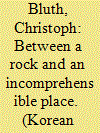

|
|
|
| 2 |
ID:
057629
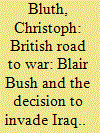

|
|
|
| 3 |
ID:
117337


|
|
|
|
|
| Publication |
2013.
|
| Summary/Abstract |
China is now a major consumer and importer of energy, and its choices and policies will increasingly affect the rest of the world. This paper analyses the key features of China's energy policy as it faces the prospect of possible challenges to its energy security given the increasing reliance on fuel imports and the need to transform its energy to meet the requirements of a modern, fast-growing economy. The paper examines whether the current energy mix is appropriate and sustainable, and considers the China's policymakers new emphasis on energy efficiency, conservation, renewable energy and the shift to natural gas the primary energy source. It examines the internal and external constraints on China's energy policy and considers the strategic dilemmas arising from China's increasing involvement in international energy markets. It concludes that both the domestic and international implications of China's search for energy security will confront policymakers with hard choices that will affect not only energy policy, but also China's geopolitical grand strategy.
|
|
|
|
|
|
|
|
|
|
|
|
|
|
|
|
| 4 |
ID:
099682


|
|
|
|
|
| Publication |
2010.
|
| Summary/Abstract |
Ever since decolonization and the partition of the former British colony of India into the states of India and Pakistan, there has been an enduring conflict between them, which has resulted in various crises. It has continued despite dramatic changes in the geopolitical environment. The conflict is over national identity, territory, and the power position in the region. The Pakistani elite have been unable to accept the division of Jamma and Kashmir and seek equal status with India, while India sees itself as a great power in the region. The conflict escalated into war at the very creation of the state of Pakistan in 1947-48, as well as in 1965 and 1971. The war in 1971 resulted in the division of Pakistan, a defeat that instilled a great sense of insecurity in Pakistan and a greater determination to find a way to overcome India's military superiority. In order to balance India's conventional military superiority, Pakistan acquired a small-scale nuclear weapons capability using bombers and medium-range missiles as delivery vehicles. Already by 1974, India had a significant nuclear industry and had demonstrated its capacity to explode nuclear devices. Whereas Pakistan's nuclear weapons doctrine is Indo-centric, India acquired a nuclear capability as part of an ambition to be recognized as a great power and seeks to deter not only Pakistan but also China. The acquisition of nuclear weapons by both India and Pakistan raises the specter of a regional nuclear conflict with catastrophic consequences. However, there is a widespread view in the strategic studies community that nuclear weapons are likely to prevent armed conflict due to the effects of nuclear deterrence and the unacceptable risks that the protagonists face in the event of war. In the case of Indo-Pak relations, however, nuclearization seems to have had the opposite effect, as the frequency of the crises has increased since both countries became declared nuclear powers. This paper is concerned with the effect of nuclear weapons on the security crisis in South Asia. The literature on the Indo-Pak conflict generally agrees that the stability of the strategic nuclear relationship is the key factor in explaining the phenomenon of the increasing frequency of crises since both countries have been acknowledged as nuclear powers. The majority of scholars claim that the strategic relationship is stable and that this stability creates a strategic space for Pakistan to initiate conflict at a conventional level. An alternative view expressed in the literature is that the strategic nuclear relationship between Pakistan and India is not stable and that the conflict is driven by this instability-in other words that the real risk of nuclear escalation gives Pakistan confidence that India will be deterred from employing its superiority at the conventional level. This paper argues that the endeavors by scholars to explain the Indo-Pak conflict on the basis of strategic stability or instability are unconvincing. The strategic studies literature asserts that strategic stability exists if two protagonists have a secure second-strike capability that is sufficiently large to inflict unacceptable damage on the opponent and thus can deter aggression. The paper argues that the strategic nuclear relationship between Pakistan and India is not stable and that deterrence of conflict between the two states is not stable. The behaviors of the protagonists cannot be explained on the basis of the balance of their nuclear and conventional capabilities, but instead are the products of strategic cognitive dissonance. This means that there is a serious risk of conflict escalating to the nuclear level.
|
|
|
|
|
|
|
|
|
|
|
|
|
|
|
|
| 5 |
ID:
098405
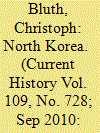

|
|
|
|
|
| Publication |
2010.
|
| Summary/Abstract |
{Adopting} unification as the central goal of policy toward the koreas...would constitute the first step on the road toward a resolution of the crisis on the prninsula.
|
|
|
|
|
|
|
|
|
|
|
|
|
|
|
|
| 6 |
ID:
047611


|
|
|
|
|
| Publication |
Aldershot, Ashgate, 2000.
|
| Description |
vii, 190p.
|
| Standard Number |
1855218968
|
|
|
|
|
|
|
|
|
|
|
|
Copies: C:1/I:0,R:0,Q:0
Circulation
| Accession# | Call# | Current Location | Status | Policy | Location |
| 043199 | 355.825119/BLU 043199 | Main | On Shelf | General | |
|
|
|
|
| 7 |
ID:
152843


|
|
|
| 8 |
ID:
010254
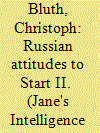

|
|
|
|
|
| Publication |
March 1996.
|
| Description |
114-116
|
|
|
|
|
|
|
|
|
|
|
|
|
|
|
|
| 9 |
ID:
017371


|
|
|
|
|
| Publication |
June 1994.
|
| Description |
263-267
|
|
|
|
|
|
|
|
|
|
|
|
|
|
|
|
| 10 |
ID:
001143
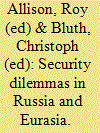

|
|
|
|
|
| Publication |
London, Royal Institute of international Affairs, 1998.
|
| Description |
xx, 358p.
|
| Standard Number |
186203026X
|
|
|
|
|
|
|
|
|
|
|
|
Copies: C:1/I:0,R:0,Q:0
Circulation
| Accession# | Call# | Current Location | Status | Policy | Location |
| 040646 | 355.033047/ALL 040646 | Main | On Shelf | General | |
|
|
|
|
| 11 |
ID:
006024


|
|
|
|
|
| Publication |
Cambridge, Cambridge University Press, 1992.
|
| Description |
xiii, 317p.
|
| Standard Number |
0521403723
|
|
|
|
|
|
|
|
|
|
|
|
Copies: C:1/I:0,R:0,Q:0
Circulation
| Accession# | Call# | Current Location | Status | Policy | Location |
| 037678 | 355.00947/BLU 037678 | Main | On Shelf | General | |
|
|
|
|
| 12 |
ID:
096797
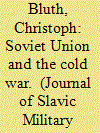

|
|
|
|
|
| Publication |
2010.
|
| Summary/Abstract |
The military competition engendered by the Cold War provoked rapid and sustained innovation in military technology. New information that has become available since the end of the Cold War permits a detailed reassessment of technical capabilities and developments in the Soviet Union, both with respect to strategic nuclear forces and to conventional weapons. This article shows that initially Soviet capabilities were subject to severe technical weaknesses that imposed major constraints on strategic options, but these were largely overcome by the 1980s. If the Soviet Union can be said to have lost the arms race, it was with respect to conventional technology. The article shows how in the perception of Soviet military planners the balance of power in Europe shifted against the Warsaw Pact in the 1980s.
|
|
|
|
|
|
|
|
|
|
|
|
|
|
|
|
| 13 |
ID:
083356


|
|
|
|
|
| Publication |
2008.
|
| Summary/Abstract |
This paper considers the evolution of U.S. strategic arms policy after the end of the Cold War. It discusses the internal debates in the U.S. government concerning the structure and purpose of U.S. strategic nuclear forces in the context of strategic arms control agreements during the Clinton period and the reasons for the failure of significant reform. It examines the Bush administration's Nuclear Posture Review and the emergence of the "New Triad" involving strategic nuclear and conventional offensive strike systems, and active and passive defenses. It also analyzes the reorganization of the defense infrastructure in the context of an international environment in which "rogue states," regional conflicts and sub-state conflicts have become the main contingencies. The paper critically assesses the assumption of U.S. strategic arms policy and concludes that the full implementation of the "New Triad" is neither likely nor advisable, but that nuclear weapons should remain weapons of last resort to deter threats to the national survival of the United States.
|
|
|
|
|
|
|
|
|
|
|
|
|
|
|
|
| 14 |
ID:
052651


|
|
|
|
|
| Publication |
Apr-Jun 2004.
|
|
|
|
|
|
|
|
|
|
|
|
|
|
|
|